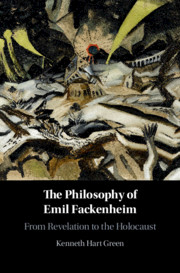Book contents
- The Philosophy of Emil Fackenheim
- The Philosophy of Emil Fackenheim
- Copyright page
- Dedication
- Epigraph
- Contents
- Acknowledgments
- Abbreviations
- Introduction The Unending Struggle with Revelation in the Thought of Emil Fackenheim
- 1 What Is Faith?
- 2 Individual versus Collective, Rational versus Mystical
- 3 Revelation as a Possibility
- 4 On Authority, Tradition, and History
- 5 Divine Power versus Human Freedom
- 6 From Presence to History
- 7 Confronting Radical Evil as Rupture
- 8 Diabolical Revelation and the Holocaust
- 9 Negative Absolute and Fragmentary Transcendence
- Conclusion Revelation of the Diabolical Truth in History
- Bibliography
- Index
3 - Revelation as a Possibility
Published online by Cambridge University Press: 06 October 2020
- The Philosophy of Emil Fackenheim
- The Philosophy of Emil Fackenheim
- Copyright page
- Dedication
- Epigraph
- Contents
- Acknowledgments
- Abbreviations
- Introduction The Unending Struggle with Revelation in the Thought of Emil Fackenheim
- 1 What Is Faith?
- 2 Individual versus Collective, Rational versus Mystical
- 3 Revelation as a Possibility
- 4 On Authority, Tradition, and History
- 5 Divine Power versus Human Freedom
- 6 From Presence to History
- 7 Confronting Radical Evil as Rupture
- 8 Diabolical Revelation and the Holocaust
- 9 Negative Absolute and Fragmentary Transcendence
- Conclusion Revelation of the Diabolical Truth in History
- Bibliography
- Index
Summary
In his defense of religion against its modern challengers, deniers, and despisers, Fackenheim regards questions concerning revelation and religious authority to be the two most essential issues affecting faith in the modern era. Is revelation plausible, or even possible? Is religious authority authentic? On what is it based? And is faith grounded in revelation and religious authority, or do they depend on faith? This last question is a matter of conceptual and existential priority. Fackenheim gives priority to faith, so the question becomes whether revelation and authority can be defended persuasively on the basis of faith. In Fackenheim’s theology, faith is the fundamental precondition for any access to truth. Contemporary thought, shaped by historicism, recognizes a certain latitude in the very notion of “faith,” so we must also ask what type of faith, religious or secular – polar opposites that historicism treats as equal, since they cannot disprove one another. Faced with this, Fackenheim must also defend the validity of religious faith as compared with secular faith.
- Type
- Chapter
- Information
- The Philosophy of Emil FackenheimFrom Revelation to the Holocaust, pp. 91 - 121Publisher: Cambridge University PressPrint publication year: 2020



